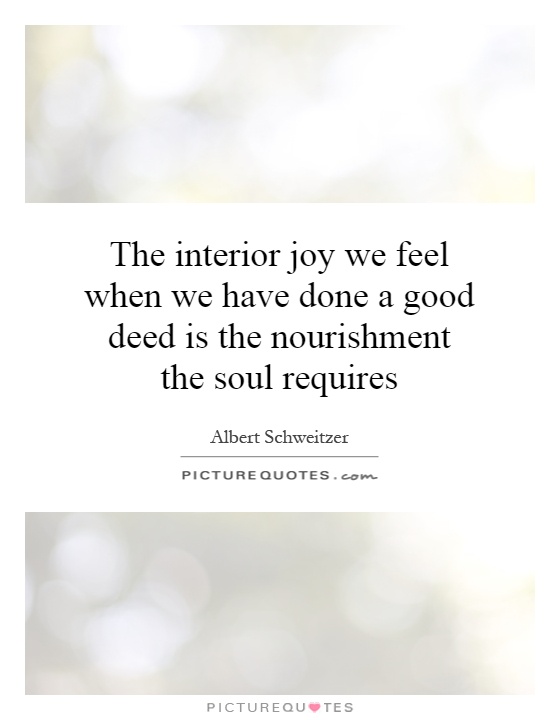The interior joy we feel when we have done a good deed is the nourishment the soul requires

The interior joy we feel when we have done a good deed is the nourishment the soul requires
Albert Schweitzer, a renowned theologian, philosopher, and physician, believed in the power of doing good deeds and the profound impact it has on the soul. He famously said, “The interior joy we feel when we have done a good deed is the nourishment the soul requires.” This statement encapsulates Schweitzer’s belief that acts of kindness and compassion not only benefit others but also nourish and uplift our own spirits.Schweitzer’s life and work exemplified his philosophy of the importance of doing good deeds. He dedicated his life to serving others, particularly through his work as a medical missionary in Africa. Schweitzer believed that true fulfillment and happiness come from selflessly helping others and making a positive impact on the world. He understood that the joy and satisfaction that come from doing good deeds are essential for nourishing the soul and finding inner peace.
The act of doing a good deed can bring about a sense of fulfillment and contentment that is unmatched by any material possession or external validation. When we help someone in need, whether it be through a small act of kindness or a larger gesture of generosity, we experience a deep sense of joy and satisfaction that resonates within us. This feeling of joy is not fleeting or superficial; it is a profound and lasting nourishment for the soul.
Schweitzer believed that the nourishment of the soul through good deeds is essential for personal growth and spiritual well-being. By engaging in acts of kindness and compassion, we cultivate a sense of empathy, gratitude, and connection with others. These qualities not only benefit those we help but also enrich our own lives and deepen our understanding of the human experience.












 Friendship Quotes
Friendship Quotes Love Quotes
Love Quotes Life Quotes
Life Quotes Funny Quotes
Funny Quotes Motivational Quotes
Motivational Quotes Inspirational Quotes
Inspirational Quotes